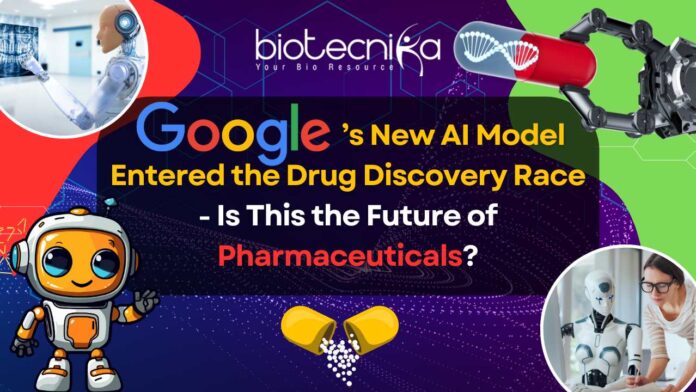Google’s New AI Model Entered the Drug Discovery Race – Is This the Future of Pharmaceuticals?
Have you ever wondered what could be the missing piece in Drug Discovery? Could AI be the missing piece in the complicated puzzle of Drug Discovery, or something else? Well, to answer Google’s latest Artificial Intelligence (AI) initiative – “TxGemma,” aims to uncover.
During a recent health-focused event in New York, Google introduced its latest and futuristic innovation in Healthcare AI – “TxGemma.” It is a collection of open Artificial Intelligence models designed to accelerate the rate of Drug Discovery. By utilizing AI, Google aims to streamline the conventional, expensive, and complicated Drug Development process, potentially transforming the Healthcare and Pharmaceutical industry.
What is “TxGemma”?
“TxGemma” is set to be released later this month through Google’s Health AI Developer Foundations program. According to Google, such AI models hold the capability to interpret both intricate structures as well as standard text of therapeutic entities including molecules, proteins, as well as chemicals. This dual capability positions “TxGemma” as a powerful and futuristic tool for researchers and scientists exploring novel drug candidates.
Google’s Chief Health Officer (CHO), Karen DeSalvo, highlighted the need for innovation in Drug Development and stated, “The development of therapeutic drugs from concept to approved use is a long and expensive process, so we’re working with the wider research community to find new ways to make this development more efficient.” She further emphasized that researchers can utilize TxGemma to generate answers to critical questions about potential novel therapeutics, like predicting their effectiveness as well as safety.
How is TxGemma Different from Existing AI Models?
TxGemma has entered a field that is already populated with advanced AI models. One of the honorable and notable successes in AI-driven Drug Research is DeepMind’s “AlphaFold.” It made extraordinary advances in predicting protein structures, which is a crucial step in the process of Drug Development. Furthermore, a Google spin-out, Isomorphic Labs, has also worked on AI-powered Drug Discovery as well as collaborated with leading Pharmaceutical companies like Novartis and Eli Lilly.
AlphaFold specializes in protein folding, while TxGemma is a more versatile AI model that can process both biochemical structures as well as standard text. This means that TxGemma could be a broader AI tool for researchers and scientists seeking insights into therapeutic compounds beyond proteins.
Even though AlphaFold has made significant strides in protein structure prediction, TxGemma takes a broader approach. But how exactly can it support researchers?
How TxGemma Can Help?
Google claims that TxGemma would empower researchers and Scientists to understand better as well as evaluate the properties of novel therapeutic compounds. By leveraging AI models that can process natural language and interpret complex biochemical structures, the system is expected to aid in predicting how well a candidate drug may perform in pre-clinical and clinical phases. This capability could reduce the expenditure as well as the time involved in bringing novel treatments to the global Healthcare market.
However, Google has not yet clarified whether third-party developers will license the AI models for commercial use, fine-tuning, or customization. TechCrunch has reached out to the company for further details and will provide updates once more information becomes available.
AI in Action: Real-World Applications
TxGemma is not the first AI-driven model for Drug Discovery. Several AI innovations have already reshaped the industry, so what do we learn from them?
AI-driven Drug Discovery isn’t theoretical anymore. In the year 2020, AI facilitated the discovery of “DSP-1181”, the first-ever AI-designed drug candidate for OCD (Obsessive-Compulsive Disorder), which advanced to clinical trials in record time. Similarly, a Biotechnology company utilizing AI for Drug Discovery, Insilico Medicine, successfully designed a drug candidate for fibrosis in just 46 days, a procedure that typically takes years.
Google’s TxGemma aims to contribute to such futuristic innovations by enabling researchers to predict drug efficacy, optimize the Drug Development pipeline, as well as analyze large Biological datasets. However, while AI promises efficiency, real-world success remains dependent on strict validation through pre-clinical as well as clinical trials.
Challenges of AI in Drug Discovery
Despite the beneficial advantages surrounding AI-driven Drug Discovery, the AI models don’t come without challenges, like:
- Accuracy & Data Bias: AI models depend on massive Biological datasets, but these Biological data can sometimes lead to incorrect research predictions.
- Regulatory Hurdles: AI-designed drugs still require extensive and rigorous validation through regulatory approvals and clinical trials, which can be time-consuming.
- Limited Generalizability: AI predictions may work well in theoretical models but often struggle in real-world laboratory settings.
Several AI-driven Biotechnology companies, such as Exscientia as well as BenevolentAI, have faced setbacks with some AI-generated drug candidates failing clinical trials. This highlights the gap between real-world therapeutic success as well as AI-driven predictions.
Who Will Benefit from “TxGemma”?
Apart from some challenges, AI continues to gain traction. With its all-open accessibility, “TxGemma” could benefit a diverse range of supporters, including:
- Pharmaceutical Companies: Leading Pharmaceutical industries can utilize “TxGemma” to reduce early-stage failures as well as optimize drug candidate selection.
- Biotechnology Startups: Several AI-focused Biotechnology firms utilize “TxGemma” to develop novel therapeutics more efficiently.
- Academic Researchers: Medical as well as university researchers can leverage the AI models to explore novel drug interactions as well as therapeutic pathways.
Investment Trends: The Growing AI-Pharmaceutical Ecosystem
The AI-driven Drug Discovery market is growing as:
- More than 460 Artificial Intelligence startups are actively working in the Drug Discovery space.
- Investors have invested more than $60 billion into AI-powered drug research.
- Pharmaceutical companies, including Novartis and Eli Lilly, continue to form collaborations with AI-driven Biotechnology companies.
Despite several hurdles, this growing investment sets a strong belief in AI’s potential to transform Pharmaceutical industries, Drug Development, as well as the Healthcare sector.
With billions flowing into AI-driven Drug Discovery, the Pharmaceutical and Healthcare industry is betting big on these advanced technologies. Will TxGemma live up to the hype?
Will TxGemma Deliver on Its Promise?
TxGemma’s launch in the global market represents Google’s continued investment in AI for Healthcare, aligning with its broader mission to use AI for societal and environmental benefits. If successful, these AI models can help bridge the gap between theoretical as well as practical AI advancements in real-world Drug Development applications.
TxGemma is another step toward AI-driven Drug Discovery. But will it truly transform the industry, or will it face the same hurdles as its predecessors? Only time will tell.
As Artificial Intelligence advances, its ability to enhance Medicine and scientific research remains a promising frontier in the quest for better, more efficient Healthcare solutions.
Google’s New AI Model Entered the Drug Discovery Race – Is This the Future of Pharmaceuticals?



























